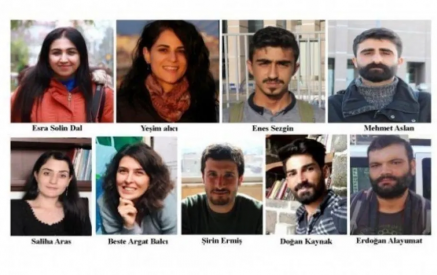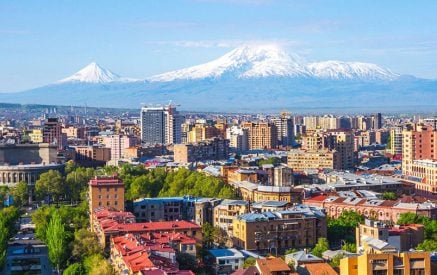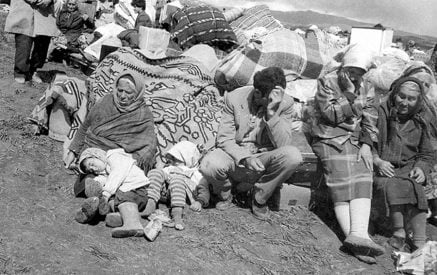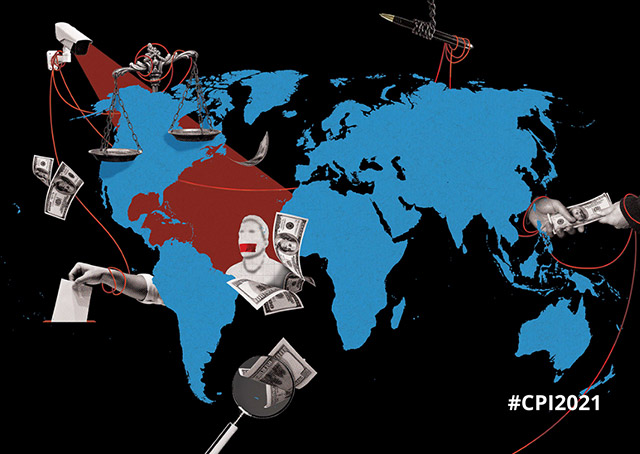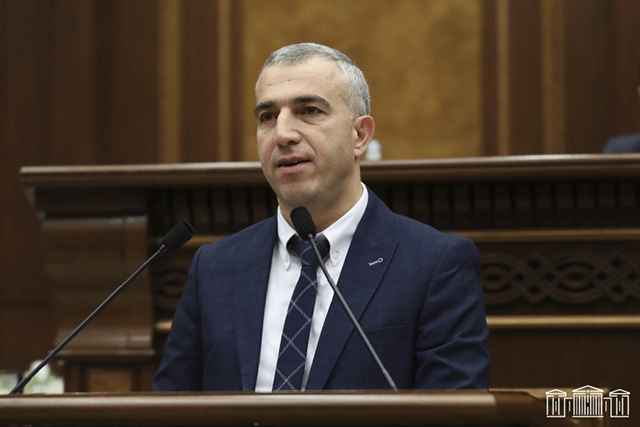2021 CORRUPTION PERCEPTIONS INDEX REVEALS A DECADE OF STAGNATING CORRUPTION LEVELS AMID HUMAN RIGHTS ABUSES & DEMOCRATIC DECLINE
27 countries at historic lows
Berlin, 25 January 2022 – The 2021 Corruption Perceptions Index (CPI) released today by Transparency International shows that corruption levels remain at a standstill worldwide, with 86 per cent of countries making little to no progress in the last 10 years.
Transparency International found countries that violate civil liberties consistently score lower on the CPI. Complacency in fighting corruption exacerbates human rights abuses and undermines democracy, setting off a vicious spiral. As these rights and freedoms erode and democracy declines, authoritarianism takes its place, contributing to even higher levels of corruption.
Read also
Delia Ferreira Rubio, Chair of Transparency International said:
“Human rights are not simply a nice-to-have in the fight against corruption. Authoritarian approaches destroy independent checks and balances and make anti-corruption efforts dependent on the whims of an elite. Ensuring people can speak freely and work collectively to hold power to account is the only sustainable route to a corruption-free society.”
GLOBAL HIGHLIGHTS
The CPI ranks 180 countries and territories by their perceived levels of public sector corruption on a scale of zero (highly corrupt) to 100 (very clean).
The CPI global average remains unchanged at 43 for the tenth year in a row, and two-thirds of countries score below 50.
- The top countries on the Index are Denmark (88), Finland (88) and New Zealand (88), all of which also rank in the top 10 per cent in the world on the Democracy Index civil liberties score.
- Somalia(13), Syria (13) and South Sudan (11) remain at the bottom of the CPI. Syria is also ranked last in civil liberties (Somalia and South Sudan are unrated).
- 27 countries – among them Cyprus (53), Lebanon (24) and Honduras (23) – are all at historic lows this year.
In the last decade, 154 countries have either declined or made no significant progress.
- Since 2012, 23 countries have significantly declined on the CPI – including advanced economies such as Australia (73), Canada (74) and the United States (67), the latter dropping out of the top 25 countries on the Index for the first time.
- 25 countries have significantly improved their scores, including Estonia (74), Seychelles (70) and Armenia (49).
For each country’s individual score and changes over time, as well as analysis for each region, see the 2021 CPI page.
CORRUPTION, HUMAN RIGHTS AND DEMOCRACY
As anti-corruption efforts stagnate and deteriorate, human rights and democracy are under attack. This is no coincidence. The continued use by governments of the COVID-19 pandemic to erode human rights and democracy could also lead to sharper declines across the globe in the future.
Of the 23 countries whose CPI score significantly declined since 2012, 19 also declined on the civil liberties score. Moreover, out of the 331 recorded cases of murdered human rights defenders in 2020, 98 per cent occurred in countries with a CPI score below 45.
- The Philippines has continued its fall beginning in 2014 to a score of 33, as President Rodrigo Duterte has cracked down on freedoms of association and expression since his election in 2016. It also has an exceptionally high murder rate of human rights defenders, with 20 killed in 2020.
- In Venezuela, the government of President Nicolás Maduro has repressed dissent from political opponents, journalists and even health care workers. The country has significantly declined on the CPI over the last decade, earning its lowest score yet of 14 in 2021.
- Mali has faced political, institutional and security crises, including three military coups during the past 10 years. Its CPI score has dropped to 29 and its civil liberties score is also declining, as ongoing armed conflict undermines key state functions, leading to a vicious cycle of corruption and human rights abuses.
- Even among democracies, the last decade has seen backsliding on both anti-corruption efforts and human rights. Poland’s civil liberties score declined and its CPI score dropped to 56, as the government cracks down on activists through insult laws and severely limits media freedom.
Transparency International calls on governments to act on their anti-corruption and human rights commitments and for people across the globe to join together in demanding change.
Daniel Eriksson, Chief Executive Officer of Transparency International said:
“In authoritarian contexts where control over government, business and the media rests with a few, social movements remain the last check on power. It is the power held by teachers, shopkeepers, students and ordinary people from all walks of life that will ultimately deliver accountability.”
About the Corruption Perceptions Index
Since its inception in 1995, the Corruption Perceptions Index has become the leading global indicator of public sector corruption. The Index scores 180 countries and territories around the world based on perceptions of public sector corruption, using data from 13 external sources, including the World Bank, World Economic Forum, private risk and consulting companies, think tanks and others. The scores reflect the views of experts and businesspeople.
The process for calculating the CPI is regularly reviewed to make sure it is as robust and coherent as possible, most recently by the European Commission’s Joint Research Centre in 2017. All the CPI scores since 2012 are comparable from one year to the next. For more information, see article: The ABCs of the CPI: How the Corruption Perceptions Index is calculated.
Notes to editors
- These countries significantly declined in the last 10 years: Australia, Bosnia and Herzegovina, Botswana, Canada, Chile, Cyprus, Guatemala, Honduras, Hungary, Lebanon, Liberia, Luxembourg, Mali, Mongolia, Nicaragua, Philippines, Poland, Saint Lucia, South Sudan, Syria, Turkey, United States of America and Venezuela. See the table with all the changes here.
- These countries significantly improved in the last 10 years: Afghanistan, Angola, Armenia, Austria, Belarus, China, Cote d’Ivoire, Estonia, Ethiopia, Greece, Guyana, Italy, Latvia, Moldova, Myanmar, Nepal, Paraguay, Senegal, Seychelles, South Korea, Tanzania, Timor-Leste, Ukraine, Uzbekistan, Vietnam
- These 27 countries are at their lowest score since the earliest comparable year of available data (2012): Australia, Belgium, Botswana, Canada, Comoros, Cyprus, Dominica, Eswatini, Honduras, Hungary, Israel, Lebanon, Lesotho, Mongolia, Netherlands, Nicaragua, Niger, Nigeria, Philippines, Poland, Serbia, Slovenia, South Sudan, Switzerland, Thailand, Turkey and Venezuela.
- Additional analysis is available for countries Transparency International has identified as important to watch, including Qatar (63) and India (40).
- Full dataset and methodology are available for download.
- See also the 2021 CPI report, which contains recommendations from Transparency International.
Armenia’s 2021 CPI score did not change compared to 2020 (49) and its standard error is 3.76 (in 2020 it was 3.50). Similar to the previous year, Armenia’s score is higher, than the global average for CPI, which is equal to 43.
For data used for the calculation of Armenia’s 2021 CPI see material “Corruption Perception Index 2021: Full Source Description”.[1] It should be noted that for the calculation of Armenia’s 2021 CPI score the same sources were used, as in 2020. Those sources are Bertelsmann Stiftung Transformation Index 2022 (BS(TI)), Corruption sub-indicator of the Freedom House Nations in Transit 2021 report (FH), Global Insight Country Risk Ratings 2020 (GI), Political Risks Services (PRS) International Country Risk 2021 Guide (PRS), Varieties of Democracy 2021 edition (VDEM) and World Economic Forum Executive Opinion Survey 2020 (WEF).[2] Figure 1 presents Armenia’s CPI scores from 2012 to 2021.
In the 2021 CPI ranking table Armenia together with Greece, Jordan and Namibia shares 58-61 places among 180 countries (in 2020 with the same CPI score it was sharing 60-62 places among 180 countries).
According to Transparency International’s regional division, Armenia, as before, is included in the Eastern Europe – Central Asia region. Table 1 shows the 2021 CPI ranking table for that region.
| Rank | Country | CPI Score 2020 | Sources | AFDB | BF (SGI) | BF (TI) | EIU | FH | GI | IMD | PERC | PRS | VDEM | WB | WEF | WJP |
| 45 | Georgia | 56 | 5 | 53 | 50 | 47 | 69 | 59 | ||||||||
| 60 | Armenia | 49 | 6 | 45 | 44 | 47 | 32 | 63 | 60 | |||||||
| 63 | Belarus | 47 | 7 | 37 | 55 | 33 | 59 | 32 | 56 | 59 | ||||||
| 67 | Montenegro | 45 | 5 | 53 | 44 | 47 | 30 | 51 | ||||||||
| 86 | Turkey | 40 | 9 | 26 | 37 | 37 | 47 | 53 | 41 | 26 | 57 | 37 | ||||
| 94 | Kazakhstan | 38 | 9 | 33 | 20 | 24 | 47 | 61 | 58 | 17 | 47 | 38 | ||||
| 94 | Serbia | 38 | 8 | 45 | 37 | 50 | 35 | 32 | 28 | 40 | 35 | |||||
| 104 | Albania | 36 | 8 | 37 | 37 | 42 | 35 | 41 | 32 | 37 | 30 | |||||
| 104 | Kosovo | 36 | 6 | 37 | 36 | 35 | 41 | 35 | 36 | |||||||
| 111 | Bosnia and Hertsogovina | 35 | 7 | 37 | 37 | 44 | 35 | 23 | 29 | 39 | ||||||
| 111 | North Macedonia | 35 | 7 | 41 | 20 | 47 | 35 | 28 | 32 | 40 | ||||||
| 115 | Moldova | 34 | 9 | 29 | 37 | 36 | 47 | 32 | 41 | 27 | 30 | 31 | ||||
| 117 | Ukraine | 33 | 9 | 41 | 20 | 36 | 35 | 35 | 41 | 26 | 30 | 34 | ||||
| 124 | Kyrgyzstan | 31 | 7 | 37 | 27 | 35 | 25 | 35 | 26 | 29 | ||||||
| 129 | Azerbaijan | 30 | 7 | 29 | 20 | 21 | 35 | 24 | 12 | 69 | ||||||
| 129 | Russia | 30 | 9 | 29 | 20 | 24 | 35 | 39 | 24 | 25 | 38 | 34 | ||||
| 146 | Uzbekistan | 26 | 7 | 29 | 20 | 24 | 22 | 25 | 27 | 37 | ||||||
| 149 | Tajikistan | 25 | 6 | 17 | 21 | 22 | 13 | 18 | 57 | |||||||
| 165 | Turkeminstan | 19 | 5 | 17 | 20 | 21 | 22 | 17 |
As it can be seen from the Table, similar to 2020 Armenia is on the 2nd place among 19 countries of the region. In the region Armenia lags only behind Georgia, whose 2021 CPI score is 55 (45-48th places in the world ranking).
As of Armenia’s neighbors, except Georgia, Armenia continues to be ahead of its three other neighbors – Turkey (96-101st places in the world ranking), Azerbaijan (128 -135th places) and Iran (150-153th places). Their 2021 CPI scores are 38, 30 and 25, respectively. Figure 2 presents the dynamics of Armenia’s and its neighbors’ CPI scores from 2012 to 2021.
Similar to 2020, all member countries of the Eurasian Economic Union (EEU) score worse, than Armenia. In particular, 2021 CPI scores of Belarus is 41 (82-84th places), Russia – 29 (136-139th places), Kyrgyzstan – 27 (144-146th places) and Kazakhstan – 37 (102-104st places). Figure 3 shows the dynamics of Armenia’s and other EEU member states CPI scores from 2012 to 2021.
[1] Data sources used for the calculation of CPI are drawn from periodical studies carried out by prominent and independent international organizations specialized in the analysis of governance and business environment. Similar to 2020, in 2021 also the sources for the calculation of CPI were 13 studies conducted by 12 such organizations.
[2] CPI score of a country is the arithmetic mean of the scores of all sources used for the calculation of score of that country. In particular, Armenia’s 2021 CPI score (49) is equal to the arithmetic mean of the scores of the abovementioned sources. The below mentioned Table 1 contains the scores of all sources for all countries included in that Table, namely, Eastern Europe and Central Asia.



















